After six grueling rounds in four days, the five invitational tournaments have concluded and the new champions of state champions have been crowned.
Below, we’ll catch up with annotations from rounds four and five courtesy of IM Robert Shlyakhtenko, as well as highlights from this morning’s final round. As a rough guide: if the board begins at the initial position, it's Robert's annotation. If it begins at a key moment later in the game, it's your author's.
More information about prizes and scholarships can be found on this year’s program. The final standings for each tournament are available here, and more prize information will be available online shortly.
Tomorrow’s report will cover rounds three and four of the U.S. Open traditional schedule, as well as the various side events taking place. For now: onto the invitationals!
Irwin
Headed into the sixth round, IM Nikoloz Managadze led the field by a full point after reeling off five consecutive wins. Domination, right? But looks can be deceiving. While he was in control end to end in his first three games, his fourth-round pairing with IM Alexander Matros (SC) came very close to causing a seismic shake-up in the standings.
After the aforementioned save and a tactical flourish to end the fifth round, Managadze needed only a last-round draw to clinch clear first in the John T. Irwin National Tournament of Senior State Champions. Indeed, a relatively tame draw against IM Timothy Taylor (CA-N) earned Managadze a repeat title and a $2,500 prize.
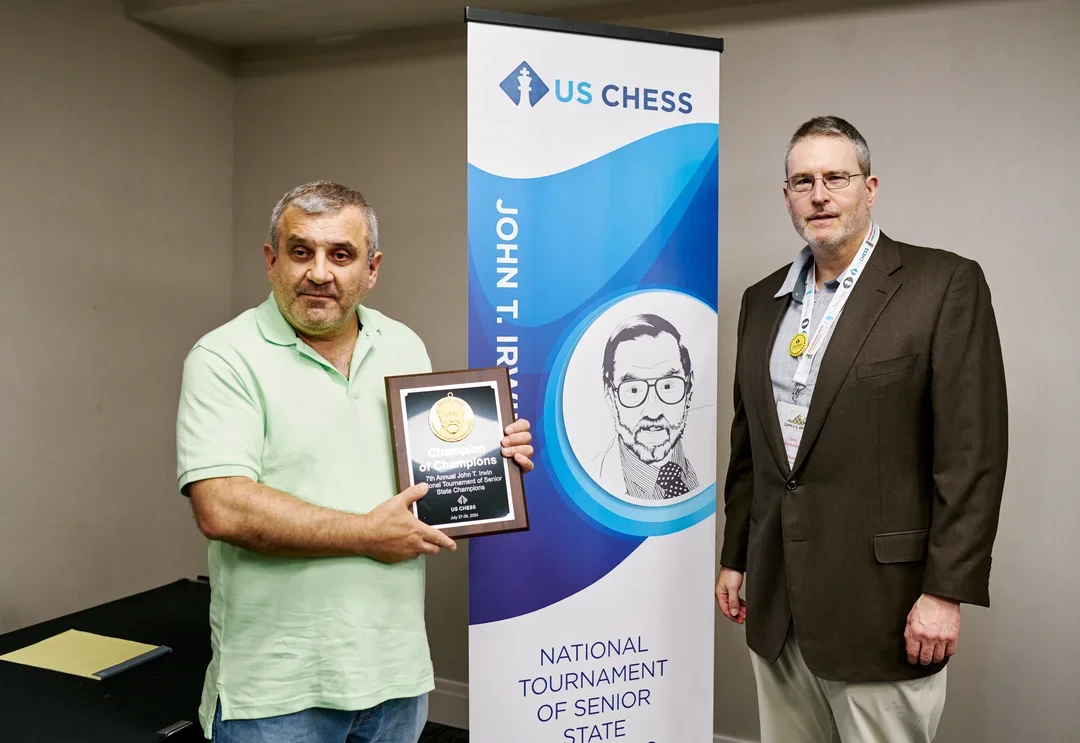
Entering the last round, Taylor was tied for second with IM Oladapo Adu (DC), meaning that a win for Adu would guarantee outright second place. But a tough matchup against GM John Fedorowicz (NY) wasn’t going to be easy. After a struggle with serious chances for Adu at the end, the players agreed to a draw:
With his draw against Managadze, Taylor and Adu both finished tied with a 4½/6 score. Below is Taylor’s fourth-round victory over IM Jonathan Yedidia (MA)
With nine players (in addition to Fedorowicz) entering the last round with 3½/5, the draws on the top two boards opened the door for a number of players to join a tie for second with a last-round win. When the dust settled, IM Igor Khmelnitsky, Matros, and FM Doug Eckert joined Taylor and Adu for a five-way tie for second on 4½/6.
The five players took home $680 each for their efforts. GM Larry Kaufman won the $500 Irwin Special Senior Chess Award for the top finisher age 75 or over.
Denker
Incoming Stanford University freshman and frequent Chess Life Online contributor IM Sandeep Sethuraman (AZ) entered the final round of the GM Arnold Denker National Tournament of High School State Champions with a half-point lead over four players tied for second with 4/5 scores. When all was said and done, Sethuraman finished first on tiebreaks with a 5/6 score, ahead of Avi Kaplan (IL) and FM Sharvesh Deviprasath (TX), who finished second and third respectively. (Editor's note: an earlier version of this article mistakenly reported that Kaplan was third on tiebreaks. This has been corrected.)
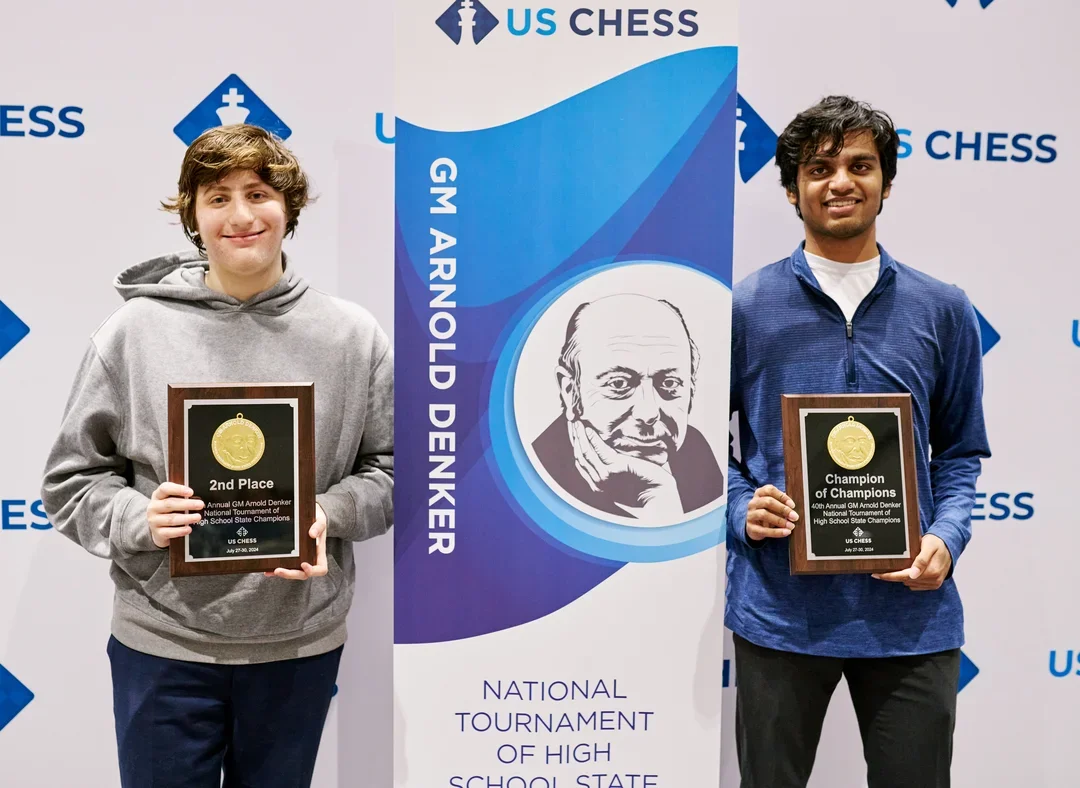
The highlight of round four was IM Gus Huston (NY)’s win over Deviprasath in the battle of the last two undefeated players.
But board two proved just as pivotal for the standings, with Sethuraman winning with the black pieces over Alex Wang (CA-S, 2324).
This set up an epic fifth-round battle between Huston and Sethuraman on the top board. At the end of a tense game and resulting mutual time scramble, Sethuraman emerged victorious to claim the outright lead:
Not to be left out, Deviprasath roared back with a nice fifth-round victory of his own, joining Huston in the pack a half-point behind Sethuraman.
In the last round, Sethuraman and IM Max Lu played a very accurate draw, guaranteeing Sethuraman a share of the title but opening the door for others.
Meanwhile, Deviprasath’s comeback tour continued with another win, this time over FM Terry Luo (DE).
On board two, Huston had a chance to tie for first with a victory over reigning 12th grade champion Avi Kaplan (IL). But, in an upset, Kaplan held a slight edge for most of the game, eventually capitalizing on a blunder to convert the full point. Kaplan joins Sethuraman and Deviprasath in a three-way tie for first with the win.
In tiebreak order, Sethuraman finished first, followed by Kaplan and then Deviprasath in third. The scholarship prizes ($5,000 for first, $3,000 for second, and $2,000 for third) are awarded based on tiebreaks, and the cash prizes are split evenly ($566 each).
IM Max Lu finished clear fourth, earning $300, and a whopping 11 players finished tied for fifth! In most tournaments, this would mean the $200 prize would be split 11 ways, but a stipulation of the tournament is that each player tying for fifth will receive $100.
Eric Feng (MA) earned the $500 Ursula Foster Memorial Award as the highest finisher 15 years old or younger as of the first day of the tournament. Feng and Xavier Bruni (AL) both were both eligible for the prize, and both finished with 3½/6 scores, but Feng slightly edged out Bruni on third tiebreak.
Elijah Cummings (VT) earned the $100 Joanne Haskel Memorial Award as the highest finisher with a rating under 2000, with an even score and the best tiebreaks.
Haring
The penultimate round of the WIM Ruth Haring National Tournament of Girls State Champions saw the highly anticipated rematch between FM Zoey Tang (OR) and WFM Megan Paragua (NY) from the 2024 U.S. Girls’ Junior Championship. Both players came out swinging, but eventually things petered out to a draw:
Holding a draw with the black pieces is always a good result, but this draw was particularly welcome for Tang, who entered the round a half-point ahead of Paragua, who yielded a draw against WFM Angela Liu (CA-S) earlier that day.
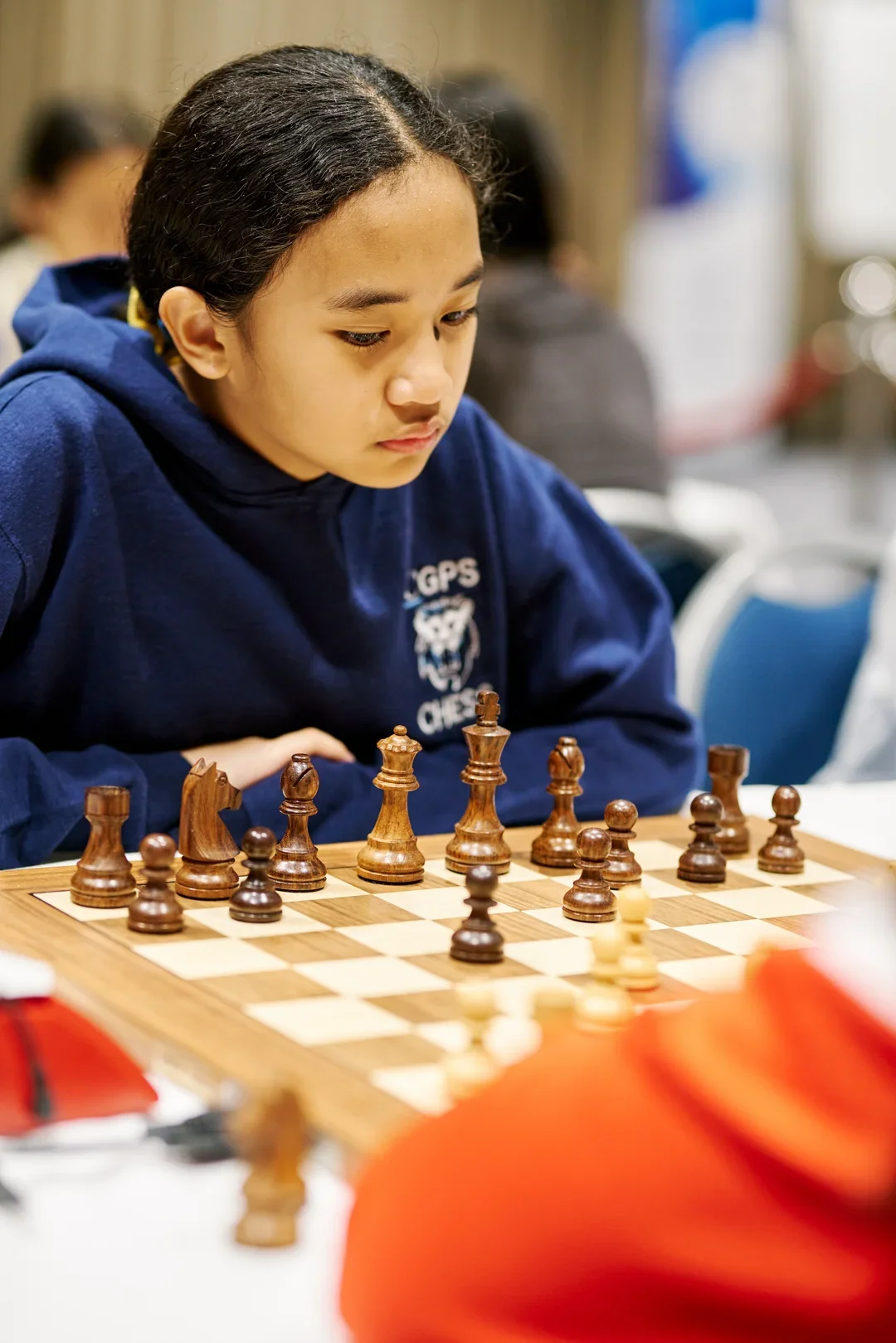
Paragua was not Tang’s only competition, though. After Liu’s fifth-round win over WCM Irene Jiao Fei (IA), Tang and Liu entered their last-round match-up tied for first with 4½/5 scores.
Four players (including Paragua) entered the last round a half-point behind the leaders, meaning a draw on board one could result in as many as four co-champions. But, despite valiant defense deep into the endgame from Liu, Tang emerged victorious:
With her win, Tang took home the top prize with a 5½/6 score. On board two, Paragua defeated Angelina Verma (MD) to claim outright second place with a 5/6 score.
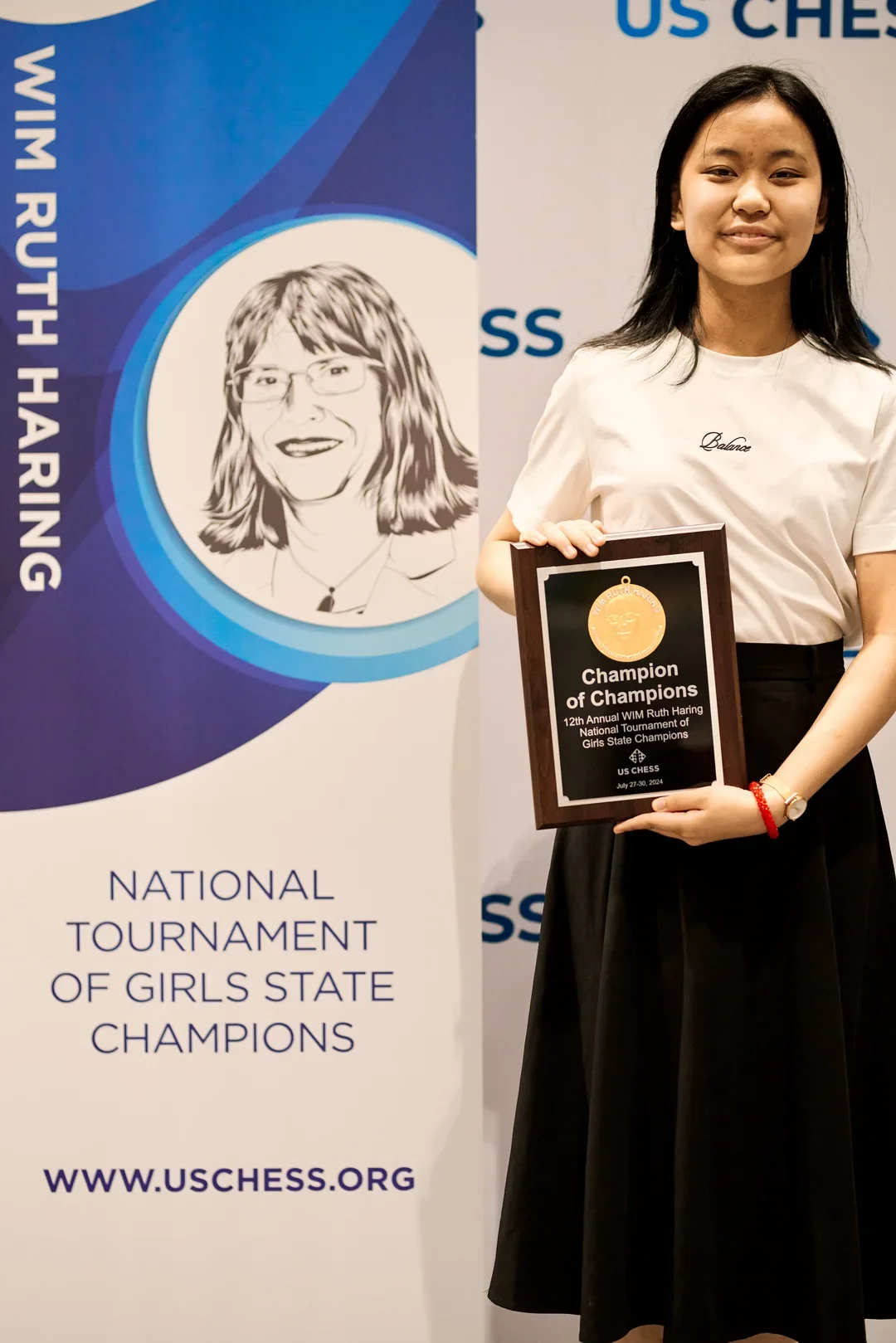
Tang earned a $5,000 scholarship for her efforts, with Paragua earning a $3,000 scholarship for clear second and Angela Liu $2,000 for finishing third on tiebreaks. Tang additionally took home $800 in cash, with Paragua earning $500. Angela Liu split the third-through-fifth prizes evenly with Lilianna Gao (CT), Chloe Wang (PA), and WIM Kelsey Liu (MA), with each player earning $225. Funding for the Haring is provided generously by the U.S. Chess Trust and ICC.
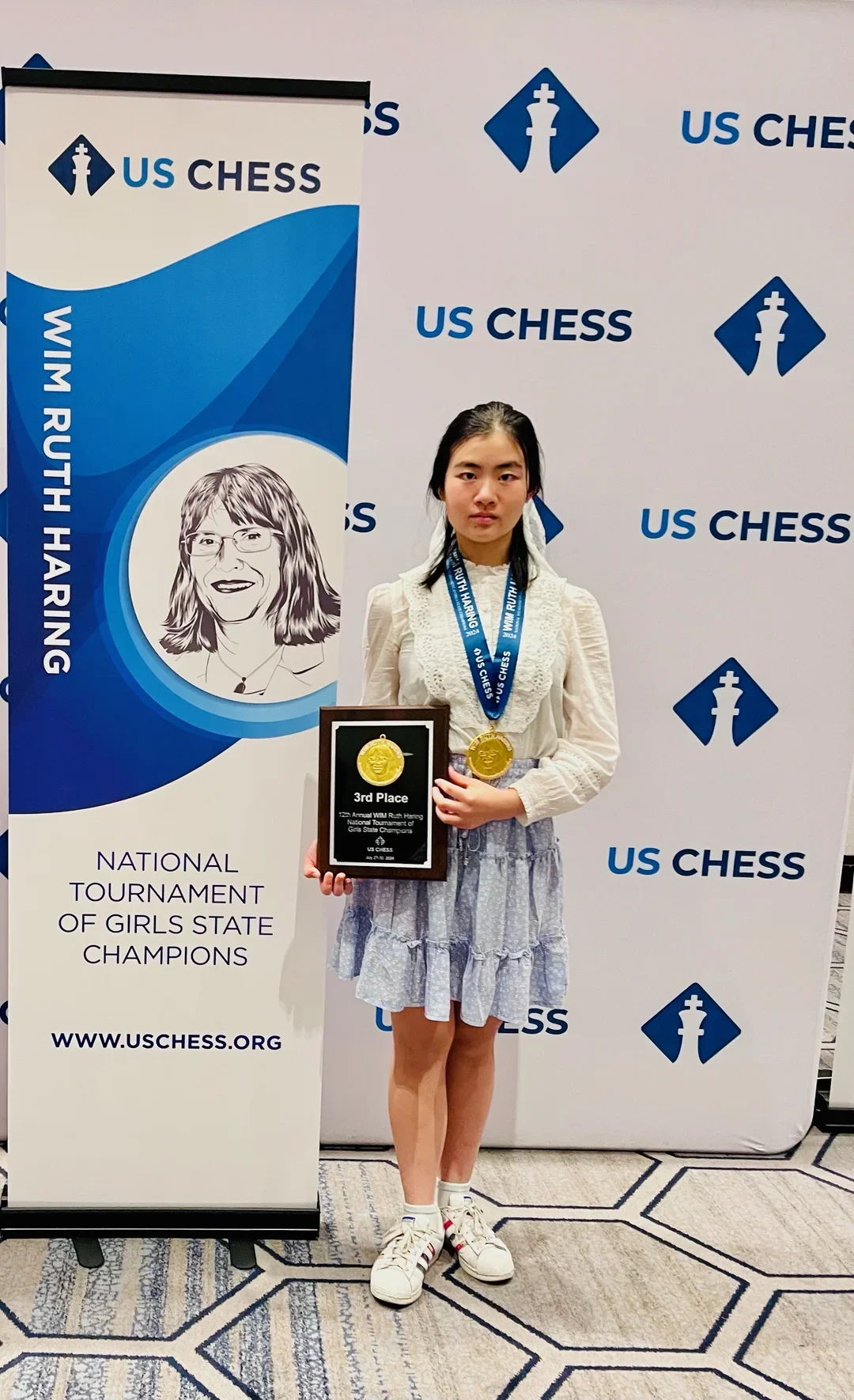
Paragua also won the $500 Ursula Foster Memorial Award as the highest finisher 11 years old or younger as of the first day of the tournament. The Foster was a competitive field, with WCM Irene Jiao Fei (IA) also eligible for the award. Fei finished in a seven-way tie for seventh place with a 4/6 score, and had the strongest tiebreaks of the bunch. The future of the Haring is bright!
Sarah Elizabeth Peter (AL) won the $100 Joanne Haskel Memorial Award will be presented to the highest finisher with an under 1600 rating, having the best tiebreaks of the under-1600 players finishing on an even 3/6 score.
Barber
So far, it’s been a good showing for the favorites at the invitationals. But, in the Dewain Barber National Tournament of Middle School Champions, Anjaneya Rao (IL) is the outright champion with a 5½/6 score, after defeating Jasmine Su (CT) in the last round. His fifth-round victory is annotated below:
In one of the last games of the tournament to finish, FM Bryan Xie and IM Eric Liu battled for a shot at outright second. In the end, Liu was victorious, finishing with a 5/6 score.
Rao earned a $5,000 scholarship for finishing in clear first, with Liu earning $3,000 for second and FM Brejesh Chakrabarti won $2,000 for finishing third on tiebreaks.
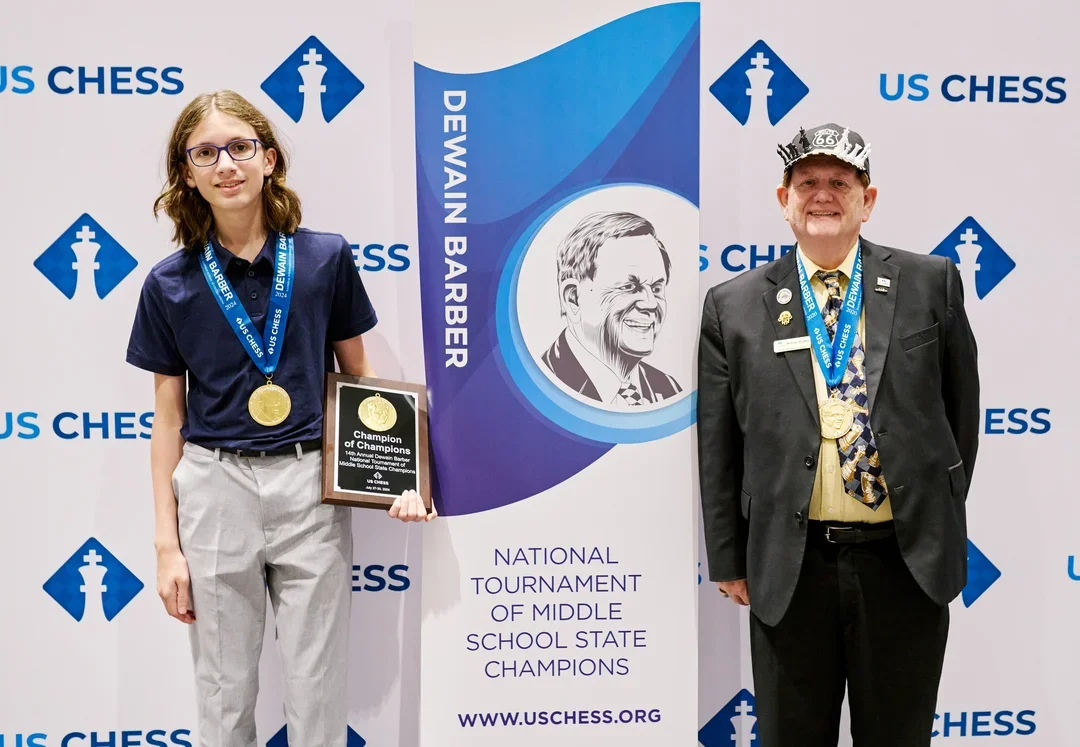
Anjaneya Rao of Illinois is the 2024 Barber Champion. To the right is tournament namesake and sponsor Dewain Barber.
Rao also took home $800 in cash, with Liu winning $500, and Chakrabarti splitting third-through-fifth with four other players, earning $180 each: Jasmine Su (CT), Alex Zhang (MO), Harshin Jagirapu (NM), and Roshan Sethuraman (AZ).
Both Jagirapu and Sethuraman were eligible for the $500 Barber 11U Chess Award, presented to the highest finisher 11 years old or younger as of the first day of the tournament. On tiebreaks, the award went to Jagirapu.
Will Hutchins (MS) won the $100 Joanne Haskel Memorial Award as the highest-placing finisher with an under 1800 rating. Hutchins finished with an even 3/6 score, and was the only under-1800 player to do so. As a note, Hutchins entered the event rated 1594, meaning he still would have won the prize had it been for under-1600 players!
Rockefeller
The John D. Rockefeller III National Tournament of Elementary School Champions saw a fitting pair of co-champions in Ted Wang (WA) and Vivan Mulay (FL). The pair drew their fifth-round game and each won their other five rounds.
Below is Wang’s highly theoretical fourth-round win and Mulay’s sixth-round miniature over a pre-tournament favorite.
Ted Wang won the $5,000 scholarship ahead of Mulay on tiebreaks, meaning Mulay won the $3,000 scholarship. Five players tied for third with 4½/6 scores, with Glenn Zhang (CA-S) winning the $2,000 by finishing third on tiebreaks.
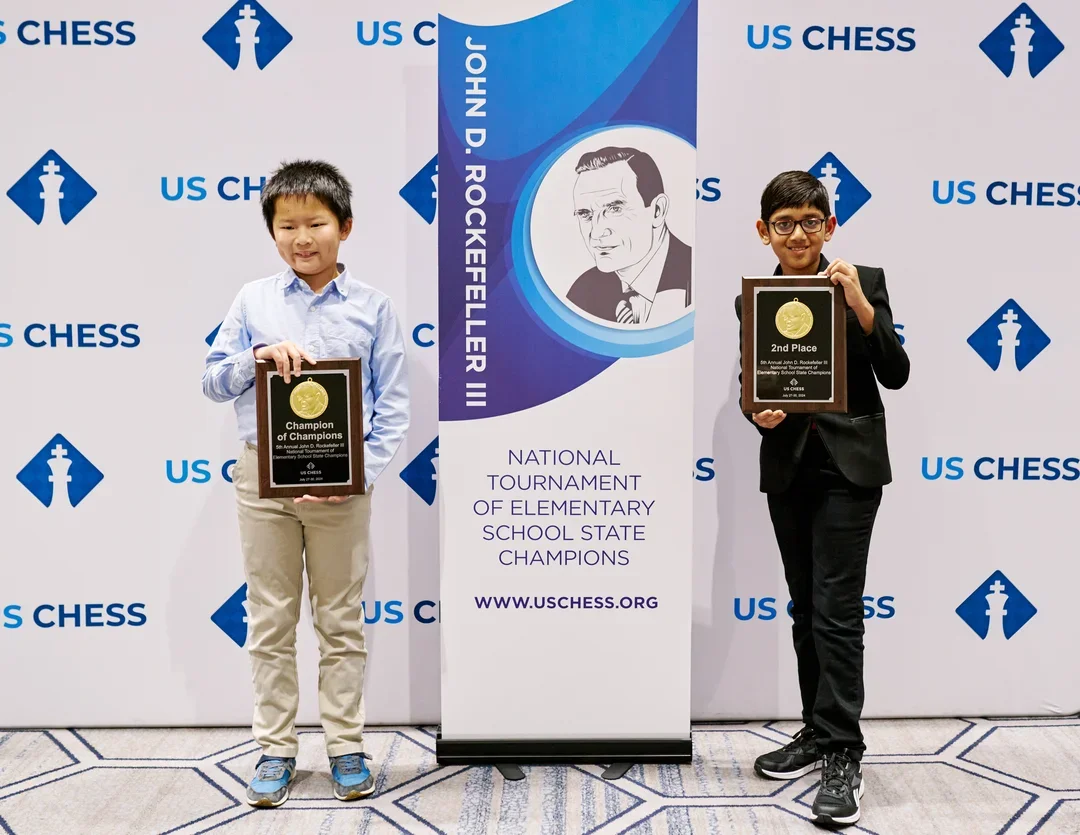
Ted Wang and Mulay split the top cash prizes, taking home $650 each. The four players, in addition to Zhang, who each won $180 for their share of third-through-fifth were: Harvey Hanke (IN), Kevin Zhao (MA), Rocky Wang (MI), and Lacey Wang (CT).
Aiden Li (IL) won the $500 Rockefeller 8U Chess Award as the highest-placing finisher 8 years old or younger as of the first day of the tournament. With a 4/6 score and a share of eighth place, Li can add the prize to a list of recent accolades that includes a silver medal from the FIDE World Cup U-8 and a gold medal from the FIDE World Blitz U-8.
Leo M Hill (NM) won the $100 Joanne Haskel Memorial Award as the highest-placing finisher with an under 1500 rating, finishing with a 3½/6 score.
Team
On top of all the aforementioned prizes and honors, there is also the question of which state produced the highest cumulative score. Based on the players above, who do you think it will be?
Boasting an average rating over 2300, New York is always a safe bet. But there were some very strong finishes from a number of other states. Indeed, it turned out to be a particularly tight race this year, with four states finishing tied for first with 21/30 scores.
In tiebreak order, the top honors went to Connecticut, Texas, Illinois, and Arizona. California-South was clear fifth with 20½/30, and New York and New Jersey tied for sixth with 20/30 scores.
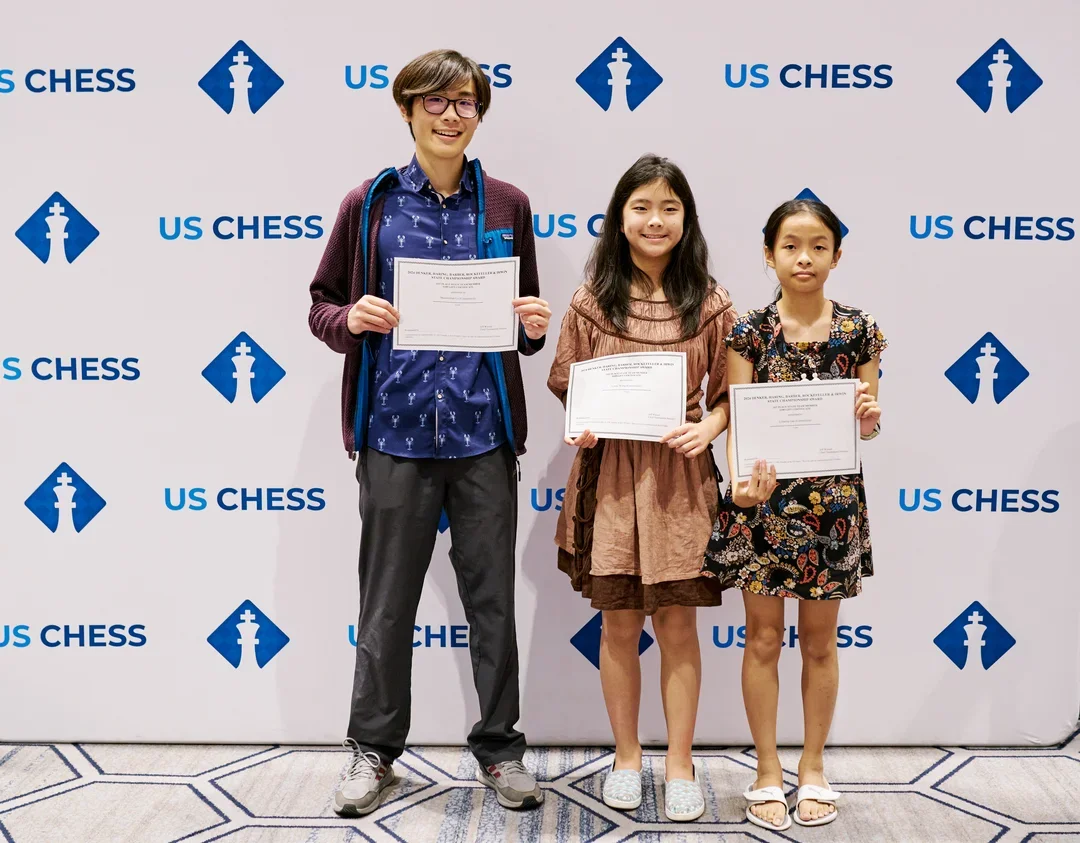
As pointed out by IM Max Lu, the Connecticut team is also unique for being a majority female team and quite possibly the first-ever majority female team to finish atop the standings. Four of the five players finished with impressive 4½/6 scores, including Lu, Jasmine Su (Barber), Lilianna Gao (Haring), and Lacey Wang (Rockefeller). Rounding out the team was Mikhail Koganov (Irwin) with a 3/6 score.
Editor’s note: If any information is incorrect, please email JJ at Click here to show email address and he will be happy to make any corrections or additions as needed.
Quick Links:
Social media tags:
Categories
Archives
- January 2026 (13)
- December 2025 (27)
- November 2025 (29)
- October 2025 (39)
- September 2025 (27)
- August 2025 (29)
- July 2025 (43)
- June 2025 (25)
- May 2025 (24)
- April 2025 (29)
- March 2025 (29)
- February 2025 (20)
- January 2025 (24)
- December 2024 (34)
- November 2024 (18)
- October 2024 (35)
- September 2024 (23)
- August 2024 (27)
- July 2024 (44)
- June 2024 (27)
- May 2024 (31)
- April 2024 (51)
- March 2024 (34)
- February 2024 (25)
- January 2024 (26)
- December 2023 (29)
- November 2023 (26)
- October 2023 (37)
- September 2023 (27)
- August 2023 (37)
- July 2023 (47)
- June 2023 (33)
- May 2023 (37)
- April 2023 (45)
- March 2023 (37)
- February 2023 (28)
- January 2023 (31)
- December 2022 (23)
- November 2022 (32)
- October 2022 (31)
- September 2022 (19)
- August 2022 (39)
- July 2022 (32)
- June 2022 (35)
- May 2022 (21)
- April 2022 (31)
- March 2022 (33)
- February 2022 (21)
- January 2022 (27)
- December 2021 (36)
- November 2021 (34)
- October 2021 (25)
- September 2021 (25)
- August 2021 (41)
- July 2021 (36)
- June 2021 (29)
- May 2021 (29)
- April 2021 (31)
- March 2021 (33)
- February 2021 (28)
- January 2021 (29)
- December 2020 (38)
- November 2020 (40)
- October 2020 (41)
- September 2020 (35)
- August 2020 (38)
- July 2020 (36)
- June 2020 (46)
- May 2020 (42)
- April 2020 (37)
- March 2020 (60)
- February 2020 (38)
- January 2020 (45)
- December 2019 (34)
- November 2019 (35)
- October 2019 (42)
- September 2019 (45)
- August 2019 (56)
- July 2019 (44)
- June 2019 (35)
- May 2019 (40)
- April 2019 (48)
- March 2019 (61)
- February 2019 (39)
- January 2019 (30)
- December 2018 (29)
- November 2018 (51)
- October 2018 (45)
- September 2018 (29)
- August 2018 (49)
- July 2018 (35)
- June 2018 (31)
- May 2018 (39)
- April 2018 (31)
- March 2018 (26)
- February 2018 (33)
- January 2018 (30)
- December 2017 (26)
- November 2017 (24)
- October 2017 (30)
- September 2017 (30)
- August 2017 (31)
- July 2017 (28)
- June 2017 (32)
- May 2017 (26)
- April 2017 (37)
- March 2017 (28)
- February 2017 (30)
- January 2017 (27)
- December 2016 (29)
- November 2016 (24)
- October 2016 (32)
- September 2016 (31)
- August 2016 (27)
- July 2016 (24)
- June 2016 (26)
- May 2016 (19)
- April 2016 (30)
- March 2016 (36)
- February 2016 (28)
- January 2016 (32)
- December 2015 (26)
- November 2015 (23)
- October 2015 (16)
- September 2015 (28)
- August 2015 (28)
- July 2015 (6)
- June 2015 (1)
- May 2015 (2)
- April 2015 (1)
- February 2015 (3)
- January 2015 (1)
- December 2014 (1)
- July 2010 (1)
- October 1991 (1)
- August 1989 (1)
- January 1988 (1)
- December 1983 (1)







